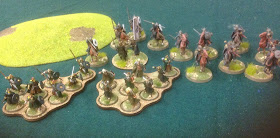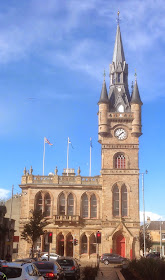Pages
Tuesday, 28 October 2014
Dystopian Wars - Ottoman Empire
Tuesday, 21 October 2014
Game of Thrones - House Stark
My painting schedule has drifted off in the last month. Busy at work and I have spent my spare evenings rebuilding the Glasgow and District Wargaming Society website. I am very pleased with the result. Please give it a visit and if you do Facebook and Twitter give us a follow there as well. I have used Weebly for this site and I am very impressed with the software.
What painting I have done is to complete my Saga Game of Thrones army for House Stark.
Ed Stark commands this force, with a figure from the Dark Sword range. A bit big for 28mm, but you can get away with this for a command figure.
The Stark and Lannister armies got their first run out on Sunday at the club. The Starks won and so Ed still has his head!
Sunday, 19 October 2014
The Long Turkish War
Friday, 10 October 2014
Hannibal: Clouds of War
It follows two unlikely friends, one a Roman and the other a Carthaginian, as they fight in the Second Punic War. The last book ended in the Battle of Cannae and the surviving legions are dispatched to Sicily. Inevitably our Carthaginian hero is also dispatched there by Hannibal to support their ally Syracuse. The book ends with Roman siege and of course the main characters meet up, albeit briefly.
I thought I knew quite a bit about the Punic wars, the Carthaginians were my first wargames army. I also associate the Sicily theatre more with the First Punic War. So I found the historical context interesting.
As with Ben Kane's other books, there is a close attention to historical detail without it slowing up the pace of book. It has all the elements you look for in the best historical fiction. The history, action, treachery and the personal interaction. Recommended.
Saturday, 4 October 2014
Somerled and the Battle of Renfrew
I attended the Somerled and the Battle of Renfrew conference today, held in the fine setting of Renfrew Town Hall. For those not familiar with Scottish town halls, many were built in the baronial style, and Renfrew is a particularly fine example.
My particular interest in this local battle goes back to a GDWS display game in 2011, Somerled's Last Stand.
Somerled, King of Argyll and Lord of the Isles died at the Battle of Renfrew otherwise called, Bargarran, Knock or Inchinnan in 1164. His Islesmen, Manx and Irish allies were defeated by a Norman/Scots army led by the High Steward, Walter Fitz-Alan. We actually know very little about the battle or the forces involved, so the game was somewhat conjectural.
The first session by Ted Cowan gave us some background to the period and, for me at least, confirmation that we have very few sources. Then Denis Rixson reviewed the evidence of the West Highland galleys that were an essential element of the armed forces of the isles. Birlinns were smaller versions of the classic Viking longship, more suited to the economy and warfare of the isles. He has a new book out on the subject.
The main primary source for the battle is a later poem, 'The Song of the Death of Somerled and the Sacking of Glasgow'. Dr Alex Woolf has a paper analysing the poem and what little it tells us about the battle.
In the lunch break we had an excellent original musical interlude from the Renfrewshire Youth Music Initiative. A haunting tune that beautifully captures the battle.
In the afternoon David Caldwell talked about Somerled and the Lordship of the Isles. Again, we have limited sources. It is likely that he came from Ireland in about 1130 to lead a brilliant campaign to recapture Argyll from the Norse and eventually became King of Argyll. David outlined the likely strongpoints and administrative structures.
Derek Alexander gave us an archeologists perspective with a description of what the area looked like in the 12C and an overview of the key players. The favourite site is on the Knock, Kemp Howe in Moor Park housing estate, but no real hard evidence. What we do know is that the victory enabled the Steward's to expand across the west of Scotland.
Really interesting day, pulling together what little we know about a little known battle that had important consequences for the development of Scotland.









